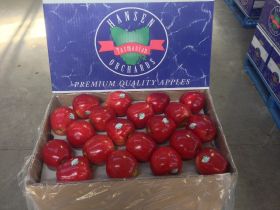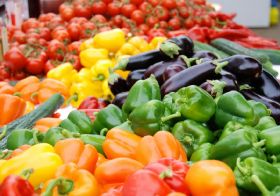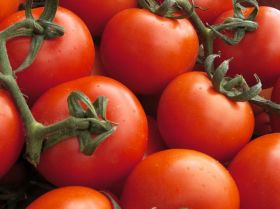Industry News
The first shipment of Australian ‘Tiger Fuji’ apples is on way and due to dock in Shanghai on Wednesday
The first container of the Australian striped apple, branded ‘Tiger Fuji’, is due to reach China on Wednesday.

Southern Tasmanian apple grower Andrew Scott from Scott Brothers told Asiafruit he’s keeping his fingers crossed it all goes well when the first container of Tiger Fuji apples reaches Shanghai.
“The trial shipments we sent to Hong Kong last year have been received really well,” said Scott. “So there’s no reason to believe it will be otherwise for the shipment to China.”
The sweet tasting, well-polished apple variety with a deep red colour has a long shelf life, said Scott, meaning it should travel well.
“This is about opening the door for all Australian apple growers, not just Tasmanians,” said Phil Pyke from Fruit Growers Tasmania, adding that Tasmania has been shipping apples to China for some time, albeit some years with much smaller quantities. “Now, we’re getting back into the game.”
“We don’t want to be a one hit wonder,” said Scott. “We want to develop a long-lasting, good quality relationship with importers and marketers to develop a cohesive business.”
Tasmanian Hansen Orchards are exporting the Scott Brothers’ Tiger Fuji, with NPC International taking care of the marketing on the ground in China.
After a trial shipment of Tiger Fuji apples to Hong Kong last year, Hansen Orchards are now planning to pack another 40ft container to Hong Kong on Monday.
Twenty-seven fatal injuries to agri-workers in the industry in 2013/14, lower than the average of 33 for the past five years
The number of agricultural employees that have died at work in Great Britain over the last year has been recorded at its lowest rate for half a decade.

There were 27 fatal injuries to workers in the industry between April 2013 and March 2014, lower than the average of 33 for the previous five years.
Provisional data released by the Health and Safety Executive (HSE) this week also revealed compared with 150 in the previous year, 133 workers were fatally injured in the most recent period the data covers – the lowest annual rate on record.
The overall rate of fatal injury has dropped to 0.44 per 100,000 workers, compared to 0.51 in 2012/13.
Judith Hackitt, HSE chair, said: “The release of the annual statistics always leads to mixed emotions. Sadness for the loss of 133 lives, and sympathy for their families, friends and workmates, but also a sense of encouragement that we continue to make progress in reducing the toll of suffering.
“Whilst these are only provisional figures, they confirm Britain’s performance in health and safety as world class. For the last eight years we have consistently recorded one of the lowest rates of fatal injuries to workers among the leading industrial nations in Europe.”
The government’s health and safety minister Mike Penning, said: “Any death at work is a death too many. But these statistics show that workplaces are getting safer.
“The Health and Safety Executive do an excellent job in making sure each and every one of us can go out to do an honest day’s work in the knowledge that our safety is being taken seriously.”
There were four fatal injuries to workers in waste and recycling between April 2013 and March 2014, lower than the average count of seven over the last five years.
In all, 106 fatal injuries in England were recorded – a rate of 0.41 deaths per 100,000 workers, compared to an average of 134 deaths in the past five years and a decrease from the 119 deaths (and rate of 0.47) recorded in 2012/13.
There were 20 fatal injuries in Scotland were recorded, a rate of 0.78 deaths per 100,000 workers, compared to an average of 21 deaths in the past five years and a decrease from the 23 deaths (and rate of 0.90) recorded in 2012/13, and seven in Wales – a rate of 0.52 deaths per 100,000 workers, compared to an average of 10 deaths in the past five years and a decrease from the 8 deaths (and rate of 0.61) recorded in 2012/13.
The Banana Growers Council is expecting Australian banana production to reach a record high over the past financial year

The Banana Growers Council has predicted a record year for Australian bananas, with total production set to surpass 29m cartons by the end of this financial year, according to ABC Rural.
“These sort of numbers, even a couple of years ago, would have completely destroyed the market,” the council’s Doug Phillips told the ABC, adding that this year market demand has matched supply.
“What we’ve seen this year is relatively reasonable return…the fruit has really flowed through the market quite well. We haven’t seen chronic over-supply.
“The fact we have seen this quantity of fruit flow through the market is testimony to the fact we are getting results through marketing, but it has been backed up with some good-quality fruit as well,” said Phillips.
According to the ABC, this record year of production puts Australia’s banana industry as the leading horticultural industry in the country, an expansion that Phillips said is a challenging but positive one.
A leading halal food producer is celebrating after landing a series of deals to give it a strong foothold across a number of European markets.

Lancashire-based KQF, which produces the Khan Exotique range of Halal certified burgers, kebabs and sausages, has signed a deal with Le Clerc, a major hypermarket chain across France, and other European countries. The deal builds on agreements with store chain Alphaprim and distFRESH, an independent halal distributor, both of which serve the Paris area.Faruk Vali, managing director of KQF, said: “Le Clerc is a key player in the market. It’s also an excellent strategic partner because it has a high profile and it’s expanding quickly. The listing of our products with such a significant retailer gives us an excellent means of introducing our halal-certified convenience foods to an entirely new group of European customers.
“Our research suggests that the European market for halal foods is buoyant. It’s currently worth around $30 billion and the figure is rising by approximately 15% a year. France has the largest Muslim population in Europe – a little under 5 million – so we developed a new product range, Khan Exotique, as our way of reaching out to that market. European consumers seem to be responding very well.”
Little Kitchen Harvest launches new chilli micro-plant to meet current consumer trend of ‘micro-leaf cuisine’
Specialist micro-plant cultivator Little Kitchen Harvest is set to hit UK retailers with an exclusive range of innovative micro-plants.

The unique plants have been developed to meet the current consumer trend of ‘micro-leaf cuisine’ and produce a continuous crop in the comfort of kitchens across the country.
The upcoming launch will focus on chillies, and be followed later in the year by a series of selected micro herbs.
A Little Kitchen Harvest spokesperson, said: “Spice is trending strongly and consumers love the interaction of being able to grow and then cook with their own produce.
“We’ve worked for two years on breeding our ‘Mighty Mouse” variety chilli pepper – to give tantalising heat but with zesty aromatics, so It’s a great hit of spice and flavour; perfect for Mexican or Thai cooking, but versatile enough for soups and sauces.”
Each micro-plant is complemented with a bespoke ceramic pot that is magnetised so that it can easily fit safely to the side of a fridge or any other magnetic surfaces in the kitchen.
The company’s spokesperson, added: “As well as creating great dishes, the products are fantastic gifts and we hope to tap into the fresh flower market.
“The launch has been devised to coincide with both Father’s Day and the upcoming festival season; where Taste Of London festival goers will be the first to see the new line.”
Pots will be priced at £5 each and initially available via www.littlekitchenharvest.com
Little Kitchen Harvest is a start-up company specialising in bringing the home-grown experience into suburban and urban kitchen spaces.
Horticultural Innovation Partnership outlines plans for Supply Chain Group to bring greater collaboration and understanding

The Horticultural Innovation Partnership (HIP) is establishing a Supply Chain Group to help better understand what is needed to drive the industry forward.
HIP, which was established in March 2013 and published its first annual report last week, has identified a diverse range of players from growers to consumers that will form the new group. It will also look to include views from related sectors such as agricultural equipment, packaging and transport.
The new group, which was recommended as a result of an analysis of the supply chain, will aim to identify the challenges requiring innovation, with an initial focus on the fresh produce sector.
The analysis also identified the need for a separate Ornamentals Group, which has now been formed and is focusing on the amenity and landscape industries.
A Research Funders Group has also been set up, aiming to achieve “better co-ordination and connection between funders through the sharing of knowledge to deliver a more effective pipeline of relevant research for horticulture.”
In a further success for the project, HIP has won the competitive tender to become co-ordinator for the BBSRC Horticulture and Potatoes Initiative, wherein HIP is “steering researchers to focus on industry-relevant challenges and ensuring that funding goes to those who will accelerate the translation of results into practical applications.”
HIP outlined its next steps as continuing to engage with funders, research providers and supply chains to achieve better co-ordination of funds and deliver a more effective pipeline of relevant research; performing a detailed analysis of the landscaping supply chain; and exploring mechanisms to bring further supply chain research funding into the community.
John Rix takes over at Greenvale’s Vales Produce Growers from Tony Bambridge, who has been chairman since its inception
Greenvale potato grower group Vales Produce Growers (VPG) has appointed John Rix as its new chairman.

He takes over from Tony Bambridge, who has been chairman of VPG since its inception.
VPG exists as the formal supply base for Greenvale, one of the UK’s leading suppliers of fresh potatoes handling 500,000 tonnes of potatoes every year.
Greenvale provides the group with marketing options both internally and externally to a wider customer base, as well as providing technical support packages through a UK-wide agronomy team.
Bambridge was instrumental in developing the group from the previous Anglian Produce co-operative to its current structure, providing a more flexible framework for supply more suited to the current challenges in the supply chain and potato sector.
He has been noted in particular for influencing the processing steering group, Vales McCains and the Birds Eye supply group, and will remain on the board of VPG.
Rix has had a very long association with Greenvale, and says he is a dedicated supporter of the strong customer relationships that they have established. His ambition with regard to VPG is to try and invigorate a progressive relationship between the excellent grower membership, the Greenvale business and their customer profile.
“I am convinced there is much that can be achieved to develop trust, commitment and profitable activity in a more closely attuned vertical supply chain in what is a rapidly changing fresh produce business,” he added.
Rix is currently chairman of PG Rix (farms) Ltd., based near Colchester in Essex.
His potato production of 370 hectares supplies nine varieties on 100% committed contracts with Greenvale. The farm’s onion production of 380 hectares is wholly dedicated to the family-owned packing business Stourgarden.
Greenvale’s sales and trading director Doug Bell, said: “We are very happy to have a grower of John’s profile and quality in the chairman’s role, and I am sure this move will add further strength to the VPG group”.

Ostrich meat is starting to appear on UK supermarket shelves, with Tesco trialling ostrich kebabs, and Lidl and Aldi due to stock the speciality meat later in the year.
Meat Trades Journal’s sister publication The Grocer revealed that Tesco is trialling free-range South African ostrich kebabs in 400 stores and offering 300g packs of four Mossel Bay ostrich kebabs for £5. It also reported that Aldi will be selling ostrich kebabs in September, with Lidl planning to roll out the exotic meat at Christmas.
Tesco’s kebabs are supplied by db foods, a Dorset wholesaler, which supplies a varied selection of meat products, including a diverse game selection. The wholesaler already supplies a large number of butchers with ostrich and the kebabs are available in Whole Food Markets.
Growers claim the modifications effectively give Morocco free access to the European market
Spain has criticised a European Commission to reform the Entry Price System for tomatoes claiming it will cause significant harm to Spanish producers by clearing the way for a massive influx of Moroccan tomatoes during the peak of the Spanish season.

The Commission announced on Monday that it would modify the way it calculates entry prices to include cherry tomatoes, instead of just round tomatoes. The proposed change will raise the average entry price and effectively means that Morocco will be allowed to export to the EU tariff-free as the entry price at which point the tariff is activated will always be higher than the preferential price of €46.1 per 100kg.
Murcian exporter association Proexport accused the commission of caving in to pressure from Morocco and other non-EU countries and effectively given them free access to the European market.
“This decision is a disaster for Spain’s tomato producers and leaves us defenceless,” said José Hernández, president of Proexport and Fepex’s Tomato Committee. “This will bring about a new pricing crisis and provoke growers to abandon farms leading to significant job losses.”
The Spanish government has been calling for the Commission to apply the rules set out under article 4 of the Association Agreement between Morocco and the EU, which requires that exports from the African country are maintained at a stable level to avoid oversupply. It also called for the entry price to be raised in order to offset the effects of the changes to the method of calculating the entry price.
EU imports of Moroccan tomatoes have increased from 194,000 tonnes in 2004 to 369,000 tonnes last year.